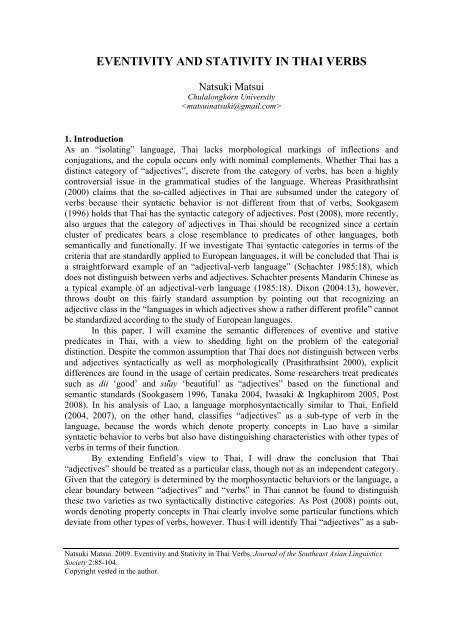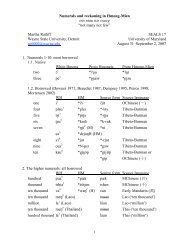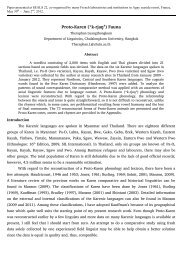proto-southwestern-tai revised: a new reconstruction - seals 22
proto-southwestern-tai revised: a new reconstruction - seals 22
proto-southwestern-tai revised: a new reconstruction - seals 22
Create successful ePaper yourself
Turn your PDF publications into a flip-book with our unique Google optimized e-Paper software.
EVENTIVITY AND STATIVITY IN THAI VERBS<br />
Natsuki Matsui<br />
Chulalongkorn University<br />
<br />
1. Introduction<br />
As an “isolating” language, Thai lacks morphological markings of inflections and<br />
conjugations, and the copula occurs only with nominal complements. Whether Thai has a<br />
distinct category of “adjectives”, discrete from the category of verbs, has been a highly<br />
controversial issue in the grammatical studies of the language. Whereas Prasithrathsint<br />
(2000) claims that the so-called adjectives in Thai are subsumed under the category of<br />
verbs because their syntactic behavior is not different from that of verbs, Sookgasem<br />
(1996) holds that Thai has the syntactic category of adjectives. Post (2008), more recently,<br />
also argues that the category of adjectives in Thai should be recognized since a cer<strong>tai</strong>n<br />
cluster of predicates bears a close resemblance to predicates of other languages, both<br />
semantically and functionally. If we investigate Thai syntactic categories in terms of the<br />
criteria that are standardly applied to European languages, it will be concluded that Thai is<br />
a straightforward example of an “adjectival-verb language” (Schachter 1985:18), which<br />
does not distinguish between verbs and adjectives. Schachter presents Mandarin Chinese as<br />
a typical example of an adjectival-verb language (1985:18). Dixon (2004:13), however,<br />
throws doubt on this fairly standard assumption by pointing out that recognizing an<br />
adjective class in the “languages in which adjectives show a rather different profile” cannot<br />
be standardized according to the study of European languages.<br />
In this paper, I will examine the semantic differences of eventive and stative<br />
predicates in Thai, with a view to shedding light on the problem of the categorial<br />
distinction. Despite the common assumption that Thai does not distinguish between verbs<br />
and adjectives syntactically as well as morphologically (Prasithrathsint 2000), explicit<br />
differences are found in the usage of cer<strong>tai</strong>n predicates. Some researchers treat predicates<br />
such as dii ‘good’ and su��ay ‘beautiful’ as “adjectives” based on the functional and<br />
semantic standards (Sookgasem 1996, Tanaka 2004, Iwasaki & Ingkaphirom 2005, Post<br />
2008). In his analysis of Lao, a language morphosyntactically similar to Thai, Enfield<br />
(2004, 2007), on the other hand, classifies “adjectives” as a sub-type of verb in the<br />
language, because the words which denote property concepts in Lao have a similar<br />
syntactic behavior to verbs but also have distinguishing characteristics with other types of<br />
verbs in terms of their function.<br />
By extending Enfield’s view to Thai, I will draw the conclusion that Thai<br />
“adjectives” should be treated as a particular class, though not as an independent category.<br />
Given that the category is determined by the morphosyntactic behaviors or the language, a<br />
clear boundary between “adjectives” and “verbs” in Thai cannot be found to distinguish<br />
these two varieties as two syntactically distinctive categories. As Post (2008) points out,<br />
words denoting property concepts in Thai clearly involve some particular functions which<br />
deviate from other types of verbs, however. Thus I will identify Thai “adjectives” as a sub-<br />
Natsuki Matsui. 2009. Eventivity and Stativity in Thai Verbs. Journal of the Southeast Asian Linguistics<br />
Society 2:85-104.<br />
Copyright vested in the author.





